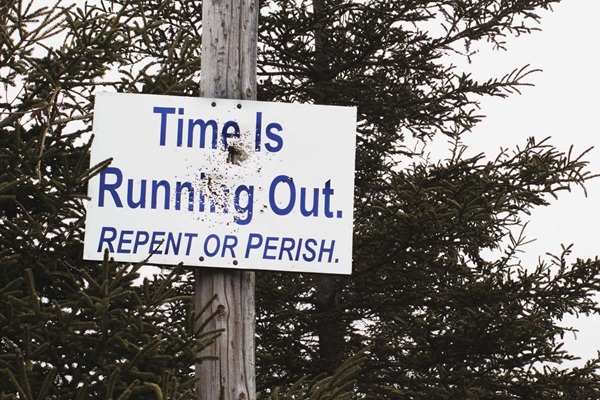Listen to this article:
My wife and I were walking around the streets of Vegas years ago when we (along with all the other tourists) were accosted by a man holding a large sign with a list of sins.
“You’re all going to hell,” he shouted. “Unless you repent!” I bet he’s a real charmer at parties.
He was trying to harness the fear of hell and the fear of God to warn us that unless we stopped engaging the things on his list and repent, we were all doomed for an eternity in hell. Or something.
Fear is an excellent motivator. It’s a fantastic tool to harness to try to curb/control behavior. Our politicians do it all the time.
However for us, Christians, I fully believe that how you get a person to your church — how you get them to believe in God — is what you have to do to keep them there. If you guilt and shame people into your church, you’re going to have to keep them feeling guilty and ashamed for them to stay. If you entertain someone into your church, you’ll have to keep them entertained so that they stay. And yes, if you scare people into the church, you’ll have to keep them scared.
But a fear-based relationship is the antithesis of what God desires.
You must repent!
We’re even told that there is no fear in love, but perfect love drives out fear (1 John 4:18a). Fear can lead us to repentance, but I genuinely don’t believe that’s God’s MO. Paul even asked, “Don’t you realize that God’s kindness is supposed to lead you to change your heart and life?” (Romans 2:4).
I started to wonder, as we picked up the pace to get away from the zealous sign-holder: does grace come first or does repentance come first?
I think Jesus beautifully answers that question with the story about the Lost Son in Luke 15. The younger son, after ruining his family and then ruining his life, decided that he needed to go back home and at least ask his father to hire him as a servant because being a servant in his father’s house was far better than the situation he created for himself.
On that long trek home, he worked out an apology and (I like to think) was rehearsing it so that he wouldn’t forget a single word because who knows how emotions may trip him up when he’s confronted by his — presumably — angry father.
The father however, Jesus says, waited for that son to come home every day, looking over the horizon wondering if today might be the day he got his son back. When he saw his son returning, the father bolted up and ran to his wayward son. As the son attempted his rehearsed speech, the father cut him off mid apology and gave the kind of bear hug only a father could give.
Grace came running towards the young son before he could even finish his apology.
Grace comes before repentance.
Returning to grace
I know that for many of us the word “repentance” (or repent) comes with a lot of baggage. It was never used in a grace-filled way but often used as a threat.
The Hebrew word for repent is t’shuva which means “to return.”
So when we repent, it doesn’t have to be dramatic as a “turn or burn” vibe. It’s simply us returning to the life that we were always meant to live; it’s us returning to the path that God always wanted us to be on; it’s us returning home, to the arms of God. It’s returning home so that we can restore what we may have marred: the image of God within us.
We repent, not to escape punishment— but we repent because we experienced grace and we know we were made for more than what we are in that moment. We repent and move towards becoming the very person God always had in mind for us.
Grace restores us. Grace transforms us. Those who encountered God’s grace are forever changed; forever marked by that experience and encounter.
For our prodigal, wayward son, grace restored him to his rightful status as an heir; a son. And not only was he restored, he was celebrated. The grace of his father mended the broken image that the young man had of himself. Grace brought him a new beginning; a new life out of death.
When God’s grace and kindness leads us to repentance, we are forever changed because our view of ourselves have changed. We now know who we really are (and always have been): a beloved child of God.
Grace has given us new life. Grace has shown us that we are truly created in the image of God. And what we have now seen can never be unseen again.
 Joseph Yoo is the author When the Saints Go Flying in. He is a West Coaster at heart contently living in Houston, Texas with his wife and son. He serves at Mosaic Church in Houston. Find more of his writing at josephyoo.com.
Joseph Yoo is the author When the Saints Go Flying in. He is a West Coaster at heart contently living in Houston, Texas with his wife and son. He serves at Mosaic Church in Houston. Find more of his writing at josephyoo.com.





